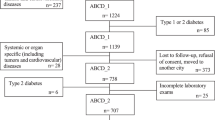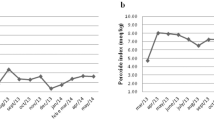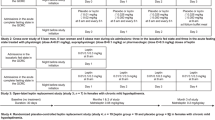Abstract
OBJECTIVE: To investigate physiological differences which could influence the balance between energy expenditure and energy intake, between habitual high-fat (HF) and low-fat (LF) consumers and the potential for weight gain.
SUBJECTS: Ten HF and nine LF consumers, all young, lean males (% energy from fat 45.4 and 31.8, respectively).
MEASUREMENTS: Habitual dietary variables (from the food frequency questionnaire, FFQ), body mass index (BMI), % body fat (% BF, measured by impedance), fasting concentrations of plasma leptin, glucose and triglycerides.
RESULTS: HF and LF subjects (selected for their fat intake) did not differ significantly in BMI or % BF. HF subjects had significantly higher concentrations of plasma leptin and lower concentrations of plasma glucose than LF subjects. In all subjects, concentrations of fasting plasma leptin correlated significantly with BMI, % BF and fat mass; difference in leptin between groups remained significant when BMI and % BF were used as covariants. Leptin significantly correlated with dietary variables; particularly dietary fat (% energy and g) and inversely with dietary carbohydrate (% energy), but showed no correlation with dietary protein or total energy intake.
CONCLUSION: Significant differences in concentrations of fasting plasma leptin have been observed between lean male HF and LF consumers. These findings suggest that the difference in leptin concentrations could be associated with a metabolic adaptation which could help to offset the weight inducing properties of high fat (high energy) diets.
This is a preview of subscription content, access via your institution
Access options
Subscribe to this journal
Receive 12 print issues and online access
$259.00 per year
only $21.58 per issue
Buy this article
- Purchase on Springer Link
- Instant access to full article PDF
Prices may be subject to local taxes which are calculated during checkout
Similar content being viewed by others
Author information
Authors and Affiliations
Additional information
Part of this work was presented to the joint winter meeting of the Nutrition Society/Association for the Study of Obesity; London, February 1998.
Rights and permissions
About this article
Cite this article
Cooling, J., Barth, J. & Blundell, J. The high-fat phenotype: Is leptin involved in the adaptive response to a high fat (high energy) diet?. Int J Obes 22, 1132–1135 (1998). https://doi.org/10.1038/sj.ijo.0800743
Received:
Revised:
Accepted:
Published:
Issue Date:
DOI: https://doi.org/10.1038/sj.ijo.0800743
Keywords
This article is cited by
-
The effect of high-fat diet on plasma ghrelin and leptin levels in rats
Journal of Physiology and Biochemistry (2009)
-
High-fat and low-fat phenotypes: habitual eating of high- and low-fat foods not related to taste preference for fat
European Journal of Clinical Nutrition (2001)
-
Relationship between dietary restraint, binge eating, and leptin in obese women
International Journal of Obesity (2001)
-
Lean male high- and low-fat phenotypes—different routes for achieving energy balance
International Journal of Obesity (2000)



